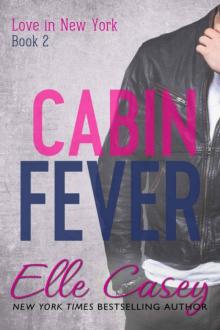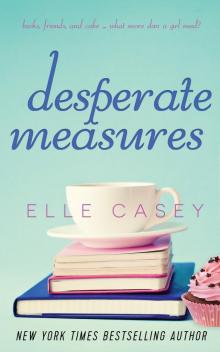- Home
- Elle Casey
Emerald Page 4
Emerald Read online
Page 4
One of our neighbors, Smitty, has taken over her hives—thank goodness, because I wasn’t crazy or stupid enough to do it myself. I understand my sister wanted to leave and that bees are critically important to our life on Earth . . . and I’m supporting her as much as I can . . . but those bees? No way. Thank goodness for Smitty. I just wish I hadn’t slept with him that one time. It makes it awkward to see him around the farm when he’s there checking on things. I keep an eye out for him, and so far I have always managed to be busy in the house whenever he comes by.
The elevator doors shut, ready to take us up to the top floor—the penthouse. My sister has to slide a plastic card into the control panel to make the buttons work. I shake my head at this additional security measure. A person might be able to break into the garage and that electronically controlled door, but they’d be stuck here in this elevator without the proper access credentials. This is such a completely different world from the one I’m used to. We don’t even lock our doors at Glenhollow Farms.
“Once we get you settled into your room, we can go out and grab some lunch,” she says.
“At the hot dog place?” I try to sound enthusiastic.
She throws her arm over my shoulders and squeezes me up against her. “Exactly.”
After a very long and slightly nerve-racking trip up and up and up, the elevator finally opens into the foyer of my sister’s apartment. The opulence hits me like a slap in the face—marble, silk, peacock feathers, gold, sparkling things, artwork that reminds me of a Jackson Pollock rip-off . . . It looks like an interior decorating warehouse exploded in here.
“Wow.” The word pops out of my mouth before I can filter it. I hope she doesn’t take offense.
“Pretty swanky, huh?” She puts her hand around my waist and pulls me into the foyer because my legs have forgotten how to work. “Home, sweet home. It came already professionally decorated. Come on . . . follow me. I’ll show you where your room is.”
Professionally decorated by a blind person, maybe. That would explain all the crushed velvet and silk, anyway.
I walk behind her down a long hallway, passing door after door. Some of them are open to various living spaces: one of them is a cinema, another is an office, and two more are bedrooms. None of them have that wow factor I saw in the foyer, thank goodness. I was starting to think an alien had taken over my sister’s brain and caused her to forget that gold lamé is something that should be avoided.
“This is your room.” She stops in the entrance and waits for me to go in first.
I step into the space. Considering what I saw in the foyer, it’s not overly decorated. In fact, I may go so far as to say it’s pretty in its simplicity. And it’s large too—almost the same size as our living room back home.
“Wowie, wow, wow. This is really cute.” I leave my bag by the door and walk in slowly. The carpet is thick and soft, a shade that reminds me of the pale peachy-pink flowers that grow on vines up the side of our house. The dark wood bed has four smooth posts that are really tall but not high enough to reach the vaulted ceilings outlined in several stacked layers of crown molding. Pink silk drapes hang on the wall opposite the door, matching the rose-and-green coverlet folded at the foot of the mattress.
“Look out the windows. Check out your view.” Amber is beaming as she ushers me forward.
I walk over and push one of the drapes aside; it’s heavier than I was expecting, with a thick white liner weighing it down and ensuring that sunlight can’t penetrate. What I see beyond the window takes my breath away. “Is that the Empire State Building?” I never imagined it would be this imposing in person, and I’m still miles away from it, I think; it’s hard to tell from up here.
“Yep.” Amber sounds proud, as if she put it there herself.
“This is really incredible.” Now I’m getting an inkling of why she might want to live here; it is pretty impressive. If I never had to leave the apartment, I might actually be able to stay here too. Not forever, but for ten days? Sure. No problem. Some of the heaviness lifts from my heart. Maybe New York won’t be quite as terrible as I feared.
“Why don’t you take fifteen seconds to unpack your bag and then come with me into the kitchen?”
I turn to look at her smarty-pants face. She’s smirking at me.
“Ha, ha, you’re hilarious.” Fifteen seconds. My sister thinks she’s so funny. Now I feel like a hick, having brought only two outfits.
She won’t leave until I prove her right, so I put my bag on the king-size bed and unzip it. I pull out the small stack of clothing from inside as my sister opens the top drawer of the dresser for me. I put everything inside it and close it with my hip.
“See?” She looks at her watch. “Oh, even less. Ten seconds. I totally called it.”
I roll my eyes and go back to my bag. “I have toiletries too, you know.” I deliberately slow my movements. I’ll be damned if it’s only going to take me fifteen seconds to unpack my sad, sorry little suitcase.
She walks over to another door and opens it. “This is your bathroom. You don’t have to share it with anybody.”
I collect my toothbrush, mini toothpaste, and hairbrush, and walk over to join her, peering inside. What I see is more opulence packed into a space larger than anyone could need.
“Holy mackerel. This bathroom is the biggest one I’ve ever seen in my entire life.” The walls and surfaces are all marble and glass. Thick nubby cotton mats lie on the floor in front of the shower, bathtub, and sink. I can see everything beyond where I’m standing thanks to the angled mirrors; farther back, there’s a desk and chair for putting on makeup—something I won’t be using because I don’t wear any—and large walk-in closets to the left and right.
“And it’s all yours.” She leans in very close and stares at me. “And you don’t have to share it.”
I have to chuckle. The number of times we’ve fought over access to our one, tiny bathroom at the farm is not lost on me. “Okay, I have to admit, it’s awesome.” I place my toiletries on the counter. They look so tiny all by themselves on the massive marble slab.
She claps with happiness. “See? I told you you’d love it.” She grabs me by the hand and pulls me out of the room. “Come on. I want to show you the kitchen.”
I follow her down the long hallway and pass through a family room big enough for twenty people, before I find myself inside a kitchen that could easily cater a large dinner party. The appliances are huge, and all of them stainless steel or black. The counters are gray-and-black granite, and the windows have views as spectacular as those from my bedroom.
“Do you actually cook in here?” I’d be afraid of leaving a stain on something. The countertops are cold against my fingertips—so different from the wood ones at the farm that have always felt warm to me, even in winter.
“To be honest, not often. We order in a lot.” She walks over and opens the fridge. “Look. We’re stocked up for weeks.”
Every single shelf in her refrigerator and freezer is jammed full of clear glass containers with colorful plastic lids on them, and they’re all labeled. I read a few of them aloud: “Butternut squash lasagna. Red curried lentils with baba ghanoush and pita on the side.” I look at her, flabbergasted. “Did you make this stuff?” I don’t know my sister at all anymore.
She grins. “Are you kidding me? You know I don’t cook.”
The relief that flows through me is almost dizzying. I thought my entire world had just turned inside out.
She shuts the doors to the refrigerator and freezer. “It’s a service. They have a menu for the week, we order what we want, and then they bring all the fresh groceries in here and cook it, box it up, put it in the fridge, and leave.”
“Wow. You have your own personal chef.” I can’t even imagine what that must be like. I’ve cooked so many lunches and dinners for our family at the farm, I’ve lost count. I started when I was eleven, which means I’ve been doing it for more than half my life now, and I know exactly how much work and pr
ep time went into making those meals in her fridge. They must have cost her and Ty a fortune. But I guess since they’re making the big bucks now, they can afford it.
A very unkind voice creeps into my head and speaks my inner, most hateful thought: Sellout.
I immediately tamp it down. My sister is not a sellout. She’s working hard and earning her money. The band offered her a ten-million-dollar fortune and she turned it down, just like Rose and I did.
Amber continues her explanation, clueless to my inner battle. “No, not a personal chef, really; close, but not quite. This way, we have some of the benefits of a personal chef, but they don’t live here with us and invade our privacy.”
“I’m starting to get the impression that your privacy is pretty important to you.” This is so strange to me, considering we were both raised on a hippie commune where anyone and everyone was welcome to live, no questions asked. All a person ever did to be a part of our extended family was be kind and work on the farm somehow—harvesting, planting, building, cleaning . . . Our mothers were always very generous and accommodating.
Amber pulls two glasses from a nearby cupboard before grabbing a bottle of wine from the refrigerator. It’s a little early in the day for drinking, but today is not a normal day. I will happily drink whatever she’s offering . . . anything that will make this easier for me.
“It is very important,” she says, nodding. “I never realized how important, though, until I kept having it taken away from me.” She pulls the cork out of the bottle with a pop. “There’s one thing I’ve learned after being around the band for these last few months: you always pay a price for fame, and the first thing to go is your private life.”
The word fame makes me think of how proud Barbara is of her daughter. “You know your mom is saving all the clippings that mention your name or have your face on them. There’re already two huge scrapbooks in our living room next to the new television.” The television was a gift from Amber, so we could stay current with the band. I never watch it. We had a TV before, but not the pretty flat-screen or the satellite plan we have now.
“I know. Believe me, she’s told me all about it.” Amber rolls her eyes.
“They’re really proud of you. I am too.”
She smiles distractedly, making sure she doesn’t spill the wine as she pours. “I’m proud of me too. I feel like I’m doing a really good job. Things are going great for the band and Ty.”
I take a full wineglass from the counter and hold it up for a toast. “Here’s to you and all of your amazing success that you totally deserve.”
“Thank you, sweetie.” She touches her stemware to mine and takes a sip. “So what are you going to do with the rest of your life?” She asks this with a twinkle in her eye, oblivious to how it will affect me.
Her question throws me for a complete loop. I wasn’t expecting it. I should have an answer ready for her, something that just slips right off my tongue, but I don’t. After seeing all the evidence of her success around me, I have to ask myself the same question she just did: What do I want to do with my life? I know she didn’t mean anything cruel by it, but it hurts that I don’t have an answer. Do I have a plan? I thought I did, but now that I think about it for two seconds, I realize my goal all along has been to just keep doing what I’ve always done. Does that count as a plan? I fear in Amber’s world that it doesn’t. And now I don’t even know if it counts as one in my world. Dammit. Just two hours into my visit, and I’m already questioning my life’s purpose. What. The. Hell.
She uses her glass to point around the room. “All this could be yours, you know.”
I’m confused. “Why? What are you talking about?”
“Well, you could come and work for the band, or you just take the ten million bucks they offered you.”
My jaw drops open in shock. “Did you take the money?” Is that how she affords this place with all of its prison-like security?
She frowns. “No, of course I didn’t.”
“Then why would I take the money?” I’m getting angry. It’s like she’s suggesting something about me that’s not very nice.
“I’m just saying . . .” She puts her hand on my arm. “I know you don’t like to get out much, and the farm doesn’t have a lot of . . . opportunities. So if you need some money or want to get some things for yourself, it would be really easy to do that.”
I back away, breaking contact. “But you know what that money means.”
She looks at me and shakes her head, almost as if she pities me. “It’s not like that. I’ve gotten to know them a lot better since I’ve been working with them.”
I feel completely betrayed. Maybe it’s a bit overly dramatic, but we’ve been put through the wringer these past few months back at Glenhollow, and apparently she either doesn’t get it or she doesn’t care. “We’ve talked about this so many times, Amber. Why are you acting like everything has suddenly changed?”
She sighs and puts her wineglass down, picking at her perfectly manicured fingernails. Her gaze drops. “You know, when we agreed not to take the money, it was because we thought it was some sort of payoff . . . like a super-lame apology for ignoring us for twenty-five years.”
I work really hard to not growl at her. “Which is exactly what it is.”
She looks up at me. “But I’ve told you what they and their attorney, Lister, told me. You remember, right? They didn’t know about us until just recently. They found out through Darrell. He’s the one who’s trying to cause them all kinds of trouble—the guy who used to be the bass player back in the beginning.”
The more she talks, the angrier I become. I know she’s trying to explain herself, and I’m trying to listen, too, but all I’m seeing is red and all I’m hearing is blah, blah, blah.
I work to keep my temper controlled. “I realize that Darrell is the one who outed you as a daughter of one of the band members to the press, and he’s the reason why you had to move into this place and get all the security to protect your privacy, but that doesn’t change the fact that those men tried to give us that money because they felt guilty.”
Her lips press together for a few seconds before she responds. “I don’t see it that way anymore.”
Be fair. Listen. This is your sister. My conscience is trying so hard to keep me on track, I have to at least try to obey it. I inhale deeply and exhale completely before I continue. “Okay, so . . . tell me how you see it.” I take a generous sip of wine, almost finishing the glass, trying to stall her inevitable argument. Maybe it’ll help to have her explain to me how suddenly thirty million dollars from absent fathers isn’t guilt money. I’m not going to run from this, as much as I might want to. I shouldn’t have to fear my sister just because she’s sharing what she considers to be the truth with me.
“Let’s go sit down.” She points to a smaller room off the kitchen. “It’ll be more comfortable.”
I consider arguing but decide against it. Refusing to sit down would be childish, and we’re beyond that—at least when we’re having serious conversations. I follow her into the room and sit down next to her on the couch with a few cushions between us. She turns sideways and rests her wineglass on her leg.
“Our fathers, whichever band members they are, did not find out about us being alive until the band manager, Ted, finally confessed to what he’d done, just a few months ago, which he did after Darrell threatened to blackmail the band with the information. The money is an apology . . . not for being bad people, but for all the missed opportunities, for the child support they would have paid if they’d known we existed. They aren’t bad men, Em. They’re really nice. They feel as robbed of the relationship as we do. They also respect and love our moms, so they’re not interested in casting blame or causing arguments over it; they just want a chance to be the fathers they are or could have been.”
I take a moment to let that digest. My short conclusion is that I don’t really believe it, and I don’t think Amber does either. “So, if it’s all hunky-dory no
w, how come you’re still not taking the money?” I stare her down, daring her to answer.
She shrugs. “I’m . . . not comfortable doing that at this point in time. I prefer to just work for them for now.”
Relief flows through me. She hasn’t totally been brainwashed, at least. “Yes. Exactly. I’m still not comfortable with it either, regardless of what you call it.” I pause, taking a few breaths to calm my emotions. My sister is not the enemy here. “You told us before that Ted was behind everything . . . that he gave our mothers the money to pay for the farm. I’m still not quite sure why he did what he did—kept our mothers’ pregnancies from the band and forced our mothers out. He pretty much admitted he completely messed with their lives. What did he expect to gain by that, by hurting all those people? How is he even keeping his job now that they know what he did—if they’re supposedly all mad about it?”
Amber traces the rim of her glass with her finger. “At the time, Ted thought he was doing his job . . . keeping the band on top and focused on building their fan base . . . meeting contractual demands by their record label, which he truly believed they’d no longer be able to do if they were focused on babies and wives. The band members themselves said enough times that families were not welcome on tour and that they weren’t interested in having families at that point in their careers. That’s how he’s justifying his actions now.”
“And you forgot those facts, I guess, when you forgave them?” Seems pretty convenient to me; for them, anyway, but not so much for us or our moms.
“No, I didn’t forget anything,” Amber says, clearly annoyed with me. “I realize they carry some of the blame here, but it’s minimal. The fact is, they were never told about us.”
I hate that Amber has become their advocate. Doesn’t she hurt inside over this like I do? It sure doesn’t seem like it. “But they never tried to contact our moms either,” I point out. “If they had, things would have turned out a lot differently.” We would have had fathers, and that’s no small thing, especially to three little girls who dreamed and talked of these mysterious beings often over the years. Amber is forgetting that part of our shared past, I guess.

 Wrecked
Wrecked Cabin Fever
Cabin Fever Drifters' Alliance, Book 2
Drifters' Alliance, Book 2 Drifters' Alliance, Book 1
Drifters' Alliance, Book 1 Just One Night, Part 1
Just One Night, Part 1 Melancholia
Melancholia Wrong Question, Right Answer
Wrong Question, Right Answer Winged Warriors
Winged Warriors Mismatched
Mismatched Wrong Place, Right Time
Wrong Place, Right Time Time Slipping
Time Slipping Dragon Riders
Dragon Riders Emerald
Emerald New World Order
New World Order Wrong Turn, Right Direction
Wrong Turn, Right Direction Kahayatle
Kahayatle By Degrees
By Degrees TROUBLE, A New Adult Romance Novel (The Rebel Series)
TROUBLE, A New Adult Romance Novel (The Rebel Series) Drifters' Alliance, Book 3
Drifters' Alliance, Book 3 Don't Make Me Beautiful
Don't Make Me Beautiful Rose
Rose Call to Arms
Call to Arms Wrong Number, Right Guy
Wrong Number, Right Guy Desperate Measures
Desperate Measures Darkness and Light
Darkness and Light Lost and Found
Lost and Found REBEL, a New Adult Romance Novel (The Rebel Series)
REBEL, a New Adult Romance Novel (The Rebel Series) Reckless
Reckless The Changelings
The Changelings MacKenzie Fire
MacKenzie Fire All the Glory
All the Glory Shine Not Burn
Shine Not Burn Amber
Amber![[Rebel Wheels 01.0] Rebel Read online](http://i1.bookreadfree.com/i1/04/01/rebel_wheels_01_0_rebel_preview.jpg) [Rebel Wheels 01.0] Rebel
[Rebel Wheels 01.0] Rebel War of the Fae
War of the Fae![[Love in New York 01.0] Lost and Found Read online](http://i1.bookreadfree.com/i2/04/11/love_in_new_york_01_0_lost_and_found_preview.jpg) [Love in New York 01.0] Lost and Found
[Love in New York 01.0] Lost and Found The Telepath Chronicles (The Future Chronicles Book 2)
The Telepath Chronicles (The Future Chronicles Book 2)